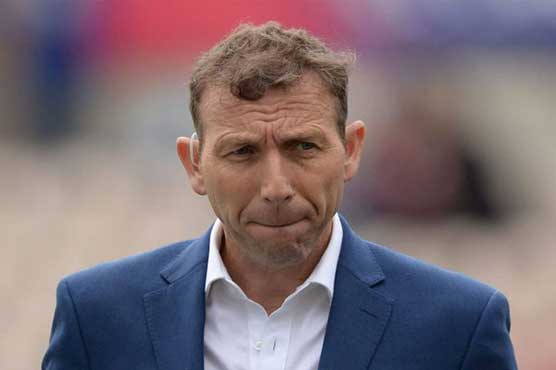Former English captain Atherton again backs Pakistan, slams ECB and ICC

He also branded the ICC as an event-organising company instead of the game�s governing body.
LAHORE (Web Desk) – Former England captain Michael Atherton has again slammed the England and Wales Cricket Board saying Monday’s decision-making had further weakened it.
He also branded the International Cricket Council (ICC) as an event-organising company instead of the game’s governing body. “In its decision-making this week, the ECB has been weak beyond measure,” declared Atherton in Thursday’s The Times, adding: “At the same time that the players have become more powerful, so some governing bodies have become weaker.
“The ICC, the game’s supposedly ultimate powerbroker, has been reduced to an events-organising company. It runs its properties well — World Cups, World Test Championships and the like — but has little standing where the game’s moral issues are concerned and little influence over the game’s direction.”
The ECB, in ‘a poorly drafted press release’ on Monday, announced it was withdrawing its sides from next month’s tours of Pakistan due to “mental and physical well-being of our players and support staff” and unideal “preparation for the ICC Men’s T20 World Cup”.
“Its (ECB) performance shows English cricket in a poor light. It has done significant damage to an already low reputation and ruined a relationship with a full-member nation, Pakistan, who have been gracious visitors to this country in five out of the past six summers.
“While England and Pakistan relations have not always been good on the cricket field, they have been lately and, as Ramiz (Raja) has pointed out, the links for Pakistan with England are of a different emotional level from, say, New Zealand or Australia. They feel totally let down,” Atherton wrote a day after he written England had failed to repay debt they owed to Pakistan in the same newsoaoer.
Atherton was also unimpressed with the absence of ECB Chirman Ian Whatmore and the composition of the ECB that lacked cricket knowledge and insight. “(Ian) Watmore has been missing in action, nowhere to be seen, when the decision to abandon Pakistan needed to be explained. Hiding behind a poorly drafted press release is not good enough.
“A board needs broad-based expertise, and there are those with experiences in law enforcement, banking, private equity, corporate law and accountancy but the lack of feel for or knowledge of the game is apparent. “There was puzzlement in the voice of Ramiz Raja, the chairman of the Pakistan Cricket Board, as though he couldn’t quite work out what was going on.
“It was fascinating to listen to Ramiz on Tuesday to get a sense, again, of how others see us (it’s not pretty by the way). Time and again he used phrases like “western bloc” and “western mentality” in discussing the cricketing divide and how we do not understand the realities on the ground in the subcontinent. “He was right, of course, on this particular issue.”
Atherton also discussed the player power, when he wrote: “If the game’s governing body in England does not understand much beyond its narrow walls, then there are also two strands at play here that outsiders would find incomprehensible: the notion of player power and the weakness of the ECB, both of which are central to an understanding of how decisions such as these can come about.
“Two factors have made the players far more powerful than previously. The first is money, and the way it is distributed, and the second is opportunity. “The results of player power can be seen around the dressing room too. Ed Smith, a bold national selector, upset one or two senior players with his views, decisions and manner. There is no national selector now.
“Player power and ECB board weakness were the driving forces behind England’s aborted tour to South Africa last winter, as they have been here. It was reported in The Guardian recently, that during the discussions around the South Africa issue, the chief-executive, Tom Harrison, who has more feel for the game than most in his organisation, sent Ashley Giles, the director of cricket, an email asking him who exactly was running the show. It is a pertinent question to be asking again this week,” Atherton concluded.
Meanwhile, Pakistan-born Australia batsman Usman Khawaja has lamented the recent abandonment of cricket tours to Pakistan, arguing it reflects double standards and how “money talks”. “I feel it’s very easy for players and organisations to say no to Pakistan, because it’s Pakistan. I think the same thing would apply too, if it were Bangladesh. But nobody would say no to India, if they’re in the same situation. “Money talks, we all know that, and that’s probably a big part of it. “They keep proving time and time again through their tournaments that they’re a safe place to play cricket. I think there’s no reason why we shouldn’t go back.”

